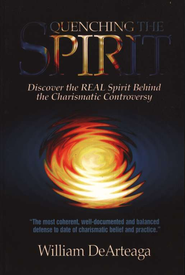William De Arteaga: Quenching the Spirit
 William De Arteaga, Quenching the Spirit: Discover the REAL Spirit behind the Charismatic Controversy (Orlando: Creation House, 1992, 1996), 358 pages, ISBN 9780884194323.
William De Arteaga, Quenching the Spirit: Discover the REAL Spirit behind the Charismatic Controversy (Orlando: Creation House, 1992, 1996), 358 pages, ISBN 9780884194323.
William De Arteaga defines pharisaism as a religious attitude and heresy that so affirms the role of tradition that a new move of the Holy Spirit is often identified as demonic (p.335). Quenching the Spirit was written to confront that attitude and show how it has led to the suppression of charismata throughout the history of the Church. Let me begin by saying that De Arteaga has produced an extremely well written work. That he has done a tremendous amount of research into church history is obvious to anyone reading this book. A very helpful feature in this work is a glossary of terms in the back. Some of his terms are either obscure or of his own making, thus the glossary is indispensable. Much inflammatory rhetoric has been written on the subject of the gifts. This reviewer believes that De Arteaga has avoided such an approach and written in an honorable manner. May more books be written as this one, promoting a cool headed discussion of differences, rather than character assassination and misrepresentation.
Overview
This book consists mainly of two parts. The first, and longest (224 pp.), is a history of attitudes towards charismata in the church. He states, “This book performs the unpleasant task of documenting resistance to the Holy Spirit” (p.15). This is admittedly over-simplifying the historical part of the book, which also contains an interesting chapter on quantum physics (really) and its application to doctrine. The second section of the book is an assessment of the reproofs and attacks brought on the modern charismatic movement.
As the title implies, De Arteaga has taken upon himself to refute the practice of quenching the spirit. Two terms, mentioned early in the book, are woven throughout: Pharisaism and consensus orthodoxy. De Arteaga’s definition of pharisaism is stated in the first sentence of this review. He defines consensus orthodoxy as the theological interpretation accepted by the majority of religious people during a given time period (p.333). Thus, with few exceptions, those dogmatically defending the consensus orthodoxy, even in the face of Scripture, are the Pharisees.
The first chapter lays out the many characteristics of the Pharisee. He begins by explaining that they were heretics (p. 16). One point he emphasizes is that they held their tradition, the Talmud, equal with Scripture, the Torah (p. 18). Because of this switch from a living God to a dead tradition, the emphasis of belief went from the heart to the head (p. 19). They set up fencing (p. 20) to keep from falling into sin. They judged others by their theology, or where they were born (pp. 21-22). In short they put doctrine over faith (p. 22) so that if anything crossed their doctrine, even the Son of God, they were opposed.
De Arteaga then begins to explain how Pharisees have been with us since the times of Christ. Chapters two and three deal with the Great Awakening, and how the opposition was pharisaical. The contrast between Jonathan Edwards, the revival’s main theologian and defender, and Charles Chauncy, its main critic and detractor, is the centerpiece of these two chapters. The next fifteen chapters deal with the historical opposition to the gifts, from early catholic monks avoiding the gifts as a fence against pride, to some dispensationalists relegating the gifts to another age. It is very informative and, being history, very interesting. Especially eye-opening is his link between cessationist doctrine and the Godless Enlightenment (ch.7). The remaining non-historical chapters, nineteen through twenty-four, deal with the modern reproof and criticism of the Charismatic movement, beginning with Charles Farah Jr., whom he is in favor of, all the way to John MacArthur Jr., with whom he strongly disagrees.
Category: Pneuma Review, Spirit, Winter 1999


